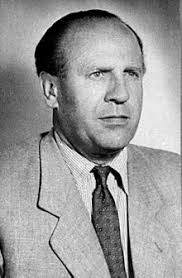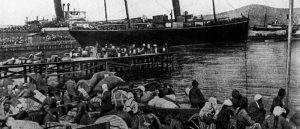Oskar Schindler, a German Industrialist, saw the outbreak of war in 1939 as an opportunity to make money. As the Nazi Army invaded Poland, Schindler took advantage of Poland’s loss by purchasing a near bankrupt factory in Krakow, that he could use to make enameled kitchenware. Taking advantage of a free labor force of Jewish people over the next few years, he amassed a fortune. 1

Having worked as a spy for Adolf Hitler, Schindler made important connections with high ranking Nazi officials. His factory, like many others in German occupied areas, exploited the labor of Jews.2 Not far from his factory in Poland was the concentration camp at Plaszow. That nearby camp was run by Amon Göth, who was known throughout the area for being ruthless and merciless. Jews, and anyone else, that were sent to his camp would almost surely die. The exact number of victims that lost their lives there is not known. However, it is estimated that 80,000 people died in Plaszow in its two-year existence.3 Having these connections with high ranking and prominent men in the Nazi Party, he was able to request to move roughly 900 Jews from this concentration camp to his factory in Krakow less than four miles away. Many of these Jews were unskilled workers, and because of this, they would not have lived long in Göth’s concentration camp. Schindler kept these Jews safe in his factory, and as one of his Jews, Moshe Bejski, a future Israeli Supreme Court Justice from 1979-91, recalled that Schindler would stay with the Jews until midnight when the Nazi soldiers would leave.4
As the Soviet Army progressively advanced its way into Poland, Schindler was forced to move his Jews to his other factory in Brunnlitz, in the Sudetenland. During the transfer, the near three hundred women, being shipped together in the same train car, were mistakenly shipped to Auschwitz. These women were being shipped in one freight train car, with little to no clothes in the middle of winter. The women and girls, many sick, old, or frostbitten, knew where they were, and that if they stayed, they would surely not make it out alive. They were forced to stay the night in the camp, many dreading the next day. Schindler, having found this out in time, personally drove to Auschwitz and bribed the Nazi officials to let him take the women back with him to his factory in the Sudetenland.5

As the Soviets marched west into Czechoslovakia, and as the war in Europe ended, it was clear to Schindler that he would need to inform his people and prepare them for life ahead. On the eighth of May, 1945, he gathered everyone onto the floor of his factory, and they listened to Winston Churchill address the world that Germany had officially surrendered. After this, he spent one last night with the near 1500 people he employed, and saved the lives of, until morning.6 He had to flee, as he could have been tried as a war criminal because he exploited the labor of hundreds, without pay. He would move many times, and in 1974 he would die. As was his request, he was, and still is buried on Mount Zion, Jerusalem. Today the people that thank Schindler for their lives, thousands in number, call themselves Schindlerjuden, or Schindler’s Jews.
- Martin Gilbert, The Righteous: The Unsung Heroes of the Holocaust (New York: Henry Holt, 2004), 224. ↵
- David Crowe, Oskar Schindler: The Untold Account of His Life, Wartime Activities, and the Truth Behind His List (New York: Westview Press, 2004), 45-50. ↵
- Salem Press Encyclopedia, 2015, s.v. “Plaszow Concentration Camp,” by Joseph Dewey. ↵
- “Moshe, Bejski,” Benjamin N. Cardoza School of Law, 2014, http://versa.cardozo.yu.edu/justices/bejski-moshe; Martin Gilbert, The Righteous: The Unsung Heroes of the Holocaust (New York: Henry Holt, 2004), 225. ↵
- David Crowe, Oskar Schindler: The Untold Account of His Life, Wartime Activities, and the Truth Behind His List (New York: Westview Press, 2004), 402. ↵
- Martin Gilbert, The Righteous: The Unsung Heroes of the Holocaust (New York: Henry Holt, 2004), 224. ↵



39 comments
Ruby Wynn
I had heard of Schindler before reading this article, but never actually knew what he did. Reading this article made me aware of how this man saved so many Jews from concentration camps and death by employing them in his factory. He treated them well and protected them, but did not pay them, so he must not have appeared suspicious to the Nazis.
Samantha Ruvalcaba
I knew a bit about Schindler from the movie, but I never made it through watching the whole thing because of how long it was. Nevertheless, I’m happy to have read this to know that he saved lives. I was worried that the article would have a different narrative because of the “virtuous nazi” title, but I was pleasantly surprised to read otherwise.
Octaviano Huron
It is sad that none of the Jewish workers in Oskar Schindler’s workforce had not even asked for compensation. They lived in a time that put their lives at stake every day, so an escape from the horrors of the Nazi rule to work for Schindler were more than enough for them to survive. Although he was a Nazi officer and a war criminal, he was revered by his workers for saving their lives in times of crisis. Overall, very well-written article.
Michael Hinojosa
Talk about a wild story from start to finish! It’s crazy to think that an alleged war crime was responsible for the safety of over thousands and thousands of people! Though I don’t think the word exploitation was of good use I still enjoyed reading the article nonetheless, especially since I was able to learn something new; so thank you for that!
Bianca-Rhae Jacquez
Schindler’s list was considered a war crime, but in reality he saved a lot of Jewish people from being executed. This article provides how Schindler was able to achieve what he did and the slight mistake that could’ve lost him lives that he was trying to save. Those who were saved by him obviously owe him their lives and are forever grateful.
Samantha Luckey
Wow, this was an extremely fascinating article. However, I would argue that writer failed to capture the true significance of Schindler’s actions. But overall the writing was well done, and this author was able to engage the reader to continue reading on, as well as, informing the reader of important details of the actions of a misunderstood man. Great work!
Madeline Torres
I’ve always loved the story of Schindler and the things he did for these Jews throughout the horrible time of WWII. I really would’ve liked if the author would’ve gone a little bit more into detail within the story but it did in fact kept me intrigued. Overall, it was a very good article and I enjoyed learning about Schindler and his story with his time as a ‘Nazi soldier’.
Natalie Thamm
This was a really interesting article, with an eye catching title, as virtue and Nazism is not something that usually is not in the same sentence. This was a really well done article, that left me conflicted throughout, as though he did save the lives of 1500 people, he exploited them during this time, which in turn makes the title a great representative of the article. Something I do wish would have been discussed was just how he treated those in his care, opposed to the vague use of “exploitation.”
Matthew Wyatt
This article could do a better job of explaining what exactly Oskar Schindler did for these people in more clear terms. The repeated use of phrases like “exploited the labor of Jews” make it exceedingly ambiguous how the author believes we should view Schindler’s legacy. Though maintaining an air of impartiality is important for the strength of a descriptive article, in this case it feels as if the author’s opinion of the man changes drastically from sentence to sentence. A future edit would benefit from providing more detail regarding why Schindler did the things he did, giving the reader more information upon which to base their own conclusion.
Lyzette Flores
Every time I read anything about the jews it is usually their tragic stories so it was nice to read about someone who helped them rather than destroyed them. It was interesting to read that Oskar Schindler was a spy for Adolf Hitler yet he helped save thousands of Jews lives. He was a very smart man as he used his business to an advantage to help jews out. Very interesting article!